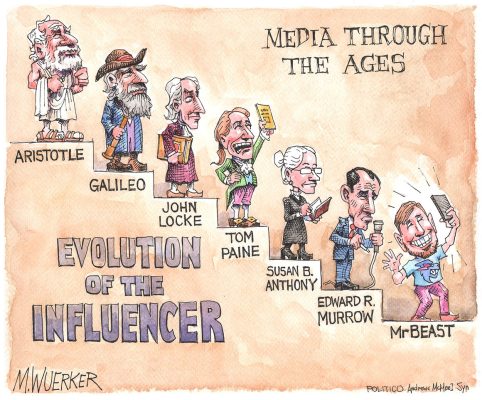Cardiologist partners wear their hearts on their sleeves in the great American healthcare debate
by Dennis Colonna

Prominent South Bay cardiologists Bruce Jackson and Gary Kissel have agreed on a lot since a 1996 Easy Reader cover story featured a day in the life of their medical practice. But the dawning of the decade finds the partners at opposite ends of the great debate over how Americans should get their healthcare.
The good doctors, of COR Healthcare in Redondo Beach and Torrance, agree that access to medical care is problematic. Tens of millions of Americans go uninsured. And both doctors have encountered frustration trying to navigate the current, complex healthcare system to assure the best care for their patients.
But they disagree on possible antidotes to the healthcare muddle, diverging along lines familiar to the public debate. Jackson urges the incorporation of much-discussed foreign elements into the American model, while Kissel cautions that wholesale changes could undermine what he calls the greatest healthcare system in the world.
The Canadian-born Jackson, a gregarious 65-year-old surfer and a lover of literature, is as likely to quote from Shakespeare, Milton or Chaucer as from the New England Journal of Medicine. His favorite Edgar Allan Poe short story is “The Tell-Tale Heart.”
Jackson’s mother and grandmother worked as nurses, and his father, grandfather and great grandfather were practicing physicians in Canada.
He came to America, dabbled in radio broadcasting and served in the U.S. Air Force before pursuing a career in medicine.
“I thought I could be of some use to mankind,” he said. “I wanted to help people and make a difference.”
Kissel, at age 70, still boasts the physique of a college athlete, and obviously practices the lifestyle he recommends for his cardiac patients.
He attended high school in Whittier, honed his skills as a gridiron star, and landed a scholarship to the University of Washington, where he majored in history and comparative literature.
He also played tight end in the 1960s when the UW team twice won the Rose Bowl.
“We were national champions in 1961,” he said. “At that time, they put the national championships before the Bowl games.”
After medical school, Kissel also served in the U.S. Air Force, during the tumultuous Vietnam War era, beginning his long career in medicine as a flight surgeon aboard a MASH helicopter rescue unit.
He was completing his cardiology fellowship program at Harbor UCLA Hospital when Jackson was starting his training. When Jackson finished, he joined Kissel in private practice, in time adding 10 other doctors.
Seeking changes
Jackson loves working in the American healthcare system, and extols its marvelous technology and high quality physicians. But he takes exception to what he sees as the inequitable and often nonexistent delivery of medical care to tens of millions of uninsured Americans.
Over breakfast in the café area at the South Bay Spectrum Club, Dr. Bruce — as patients affectionately call him – contended that the U.S. should incorporate elements of the single-payer healthcare systems utilized in other countries.
He said private health insurance providers in California can spend large amounts — as much as 34 cents out of every dollar — to administer health plans.
“They really do very little else. They occasionally give us advisories about medications that might interact with one another. And they occasionally provide services to patients with heart failure, which consists of someone telling them to check their weight everyday and avoid salt,” he said.
Pointing to Tricare, the healthcare program offered to active-duty military, retirees and their families, Jackson said only seven cents of every dollar goes to items other than actual care, such as administrative costs.
“So military people and their families actually have Tricare spending more money on their actual healthcare needs than private insurers do,” he said.
“When we need to order tests on a Tricare patient, it is done with very little fuss and paperwork, and very few denials, whereas if it is done on a patient with private insurance, very often, there are a lot of denials,” Jackson said.
Nicole Evans, spokeswoman for the California Association of Healthcare Plans, disputed Jackson’s figures, saying that about 89 percent of every dollar taken in premiums is spent on actual healthcare, with just over 9 percent going towards administrative costs and profits.

She also said administrative costs for group employer health plans are cheaper to administrate than those sold on the individual market, and newer plans generally have higher administrative costs because of all the marketing involved to enroll new customers in the plans.
“Our goal is to offer affordable, quality healthcare to all,” Evans said.
Jackson said people with pre-existing medical conditions, who lose their jobs and employer-based healthcare, find it virtually impossible to get affordable, private health insurance that meets their needs. Bush and Obama administration figures have placed the number of uninsured in America at 40 million or more.
“Currently, if you have an employer who provides healthcare, and you are lucky enough to have that employer for life, you are in good shape. But Lord forbid, you change employers or lose your job,” he said.
Jackson talked up elements of Canada’s publicly funded system that aims to provide coverage to all its citizens.
“You do not find a lot of brand name drugs – you do not find your sixth or seventh statin available in Canada. There is a huge push in that country to find the most effective and the most affordable generic medication,” Jackson said.
“And if there is a new drug, or one that wants to be, they really want to see that there is some evidence-based medicine, some proof or offer of proof, that there is some safety and efficacy in a new medicine,” he said.
Canadians, Jackson said, do not pay a lot of money for medical malpractice, a bane of modern medicine in the U.S., which exists in a limited and somewhat simplified form north of the border.
“Personal injury lawyers do not advertise their services on the back of Toronto buses,” he said, “Moreover, you don’t have pharmaceutical representatives, God bless them, showing up and buying lunch for the doctors and their staffs.”
Jackson said he was surprised by the pushback against the Patient Protection and Affordable Care Act signed into law by President Obama last March, which some lawmakers want to repeal.
The hotly debated legislation extends dependent coverage to age 26, aims to prevent insurance carriers from denying coverage to children with pre-existing conditions, and to bar yearly and lifetime limits on care.
“A lot of fiction has been put out about the new healthcare legislation because there are very large financial forces that are trying to keep the past continuing into the present,” Jackson said. “It has been driven in large part by the insurance companies and by an almost equally large part by the pharmaceutical industry.”
He contended that a large portion of “corporate welfare” was instituted under the Bush administration, when the “Medicare Part D” prescription drug coverage was passed.
“Somewhere in excess of $700 million basically went to fund pharmaceutical companies,” he said. “There didn’t appear to be a huge amount of debate.”
Jackson said the new U.S. legislation will benefit “the almost 40 million people in this country who can’t get or are unable to qualify for insurance,” people who are denied treatments by their insurance providers, and people with pre-existing conditions who have lost their jobs.
But Jackson said he doesn’t know what will happen with people who are happily covered under employer-based group insurance programs, especially those with high-end coverage and minimal deductibles.
“I don’t know what is going to happen. Those are political forces that are beyond my reach and knowledge,” he said.
“But the current system, where insurance companies deny and ration care, does exist,” he said.
He believes there will still be plenty of money to be made for medical technology companies because there will always be a need for new products. And he believes that his earnings, which have been “nickeled, dimed, and rationed to death substantially by insurance companies over the years,” will not significantly decrease.
“We simply can’t go back to where we were before this legislation was passed,” he said. “We just can’t.”
Preserving excellence
Several days after the café interview, with Jackson on vacation, Kissel entertained the debate in his office, in between hospital procedures and seeing patients in clinic.
When asked how his views on healthcare differ from Jackson’s, the mild-mannered Kissel paused before replying, “I am very fond of Bruce. We are good friends as well as medical partners. I would throw myself in front of a car for him. And we don’t necessarily disagree a whole lot on healthcare reform, but I just think we should go down different roads.”
Kissel said he is leery of any fundamental changes to the U.S. healthcare system, stressing the word “fundamental.”
“I think we have the best healthcare system in the world. The technology we now have is remarkable,” he said.
“When I started practice we did have coronary bypass surgery. One would have to take a look at the arteries of the heart, and then, if there were significant blockages, the only treatment was to take veins out of the legs and bypass the blocked artery inside the chest and heart.
“That was the case for years, until the early ‘80s when the first balloon angioplasty and catheter artery treatments were introduced. And as the 1980s evolved, what would have been a 100 percent surgery necessity has changed to treating our patients 80 and 90 percent of the time with a balloon or stent.”
How does Kissel think we should address the problem of the 40 million un-insured in this country if not through the Affordable Healthcare and Portability Act passed by Congress earlier this year?
“I don’t have the answer to that. I think our system needs some overhauling, but, once again, not fundamentally,” he said.
“If it were fundamentally changed, we would have to virtually destroy the system we now have and create something completely anew. That is what I would call fundamental change and I don’t want to see that happen. I would be opposed to that. In America, we have the best doctors in the world. This is where everyone wants to come for their medical care,” Kissel said.
“There is a good reason for everyone wanting to come here for medical care. We are on the cutting edge. We develop all the great technology and we are it. We are the top star and continue to be so, year after year, decade after decade,” he said.
As he spoke, Kissel pulled up the results of a patient’s echocardiograms and carotid artery scans on his computer, showing how technological advances have made his job as a cardiologist “so much easier these days.”
Kissel, “a strong patriotic American,” said American medical excellence can be partly attributed to the belief that people in this country have the opportunity to do whatever they want to do.
“You can make all the choices you want. Nothing is carved in stone. You can be a late bloomer in this country. In any other country in the world, if you are a late bloomer, you’re stuck, because your life in those countries is carved in stone at 16 or 18,” he said. “It doesn’t happen here in America and so we can pursue anything we want to here with hard work, dedication and diligence, by putting our heart and soul into anything we want to do.”
Kissel believes that applying that attitude to his practice as a physician “is just wonderful.” He said we have the best doctors in the world because “doctors who get to that level do so because they know they might be rewarded for their hard work and service.”
Kissel also believes an important benefit of the American healthcare system is the dedication that physicians have to making things better for their patients by working long hours. He points out that he spent half of his life developing his skills as a doctor before he went into private practice.
He is concerned that a fundamental change would lead to “mediocrity,” and he is adamant in asserting that he doesn’t want to see that happen.
He said sweeping changes could “make us one of the pack and not the leader of the pack.”
But he said some changes should be made.
“Yes, we need to change and improve upon the system and I do support lowering the Medicare age, not to 35, however, but it should be lowered,” he said, referring to the public plan for Americans 65 and older,” he said.
“And how do we offer insurance for those who don’t have it? We have to work that out and I don’t have a specific answer. I am not a politician. That is something the politicians are going to have to carve out,” Kissel said.
He does not want to see a single-payer healthcare system like other industrialized areas of the world, especially what he has seen in Europe. And he becomes a little perturbed when people question him about the morality of allowing so many of our citizens to remain without healthcare, when other industrialized nations in the world view medical services as a “human right.”
“Americans are the most generous people in the world. We give more to charities and foundations than citizens in any other country,” Kissel said.
“We are not tightwads in this country,” Kissel said. “I just believe that we should do this with our money and not big government’s. We like to make the choices ourselves, not have government do so.”
He doesn’t believe that a collectivist attitude towards healthcare would be beneficial to Americans. He said his great-grandparents left Russia because Lenin was executing people “so they could be collective. We came here not to be collective but to be individual citizens who could pursue their rights and options in life.” ER









